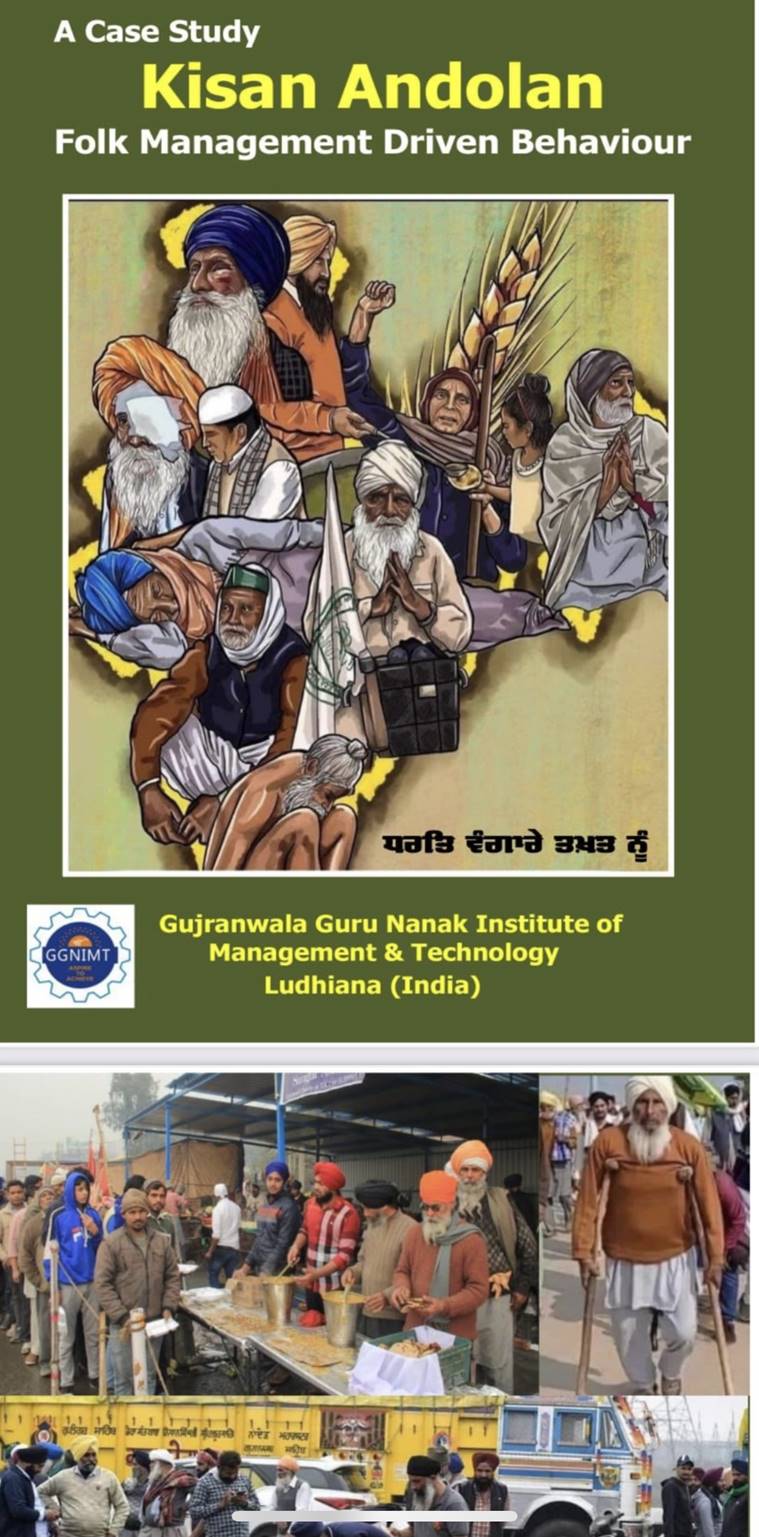The book titled ‘Kisan Andolan’, A Folk Management Driven Behaviour, that was released Wednesday talks about how without any formal management training, farmers used rustic wisdom to run a successful movement in harsh conditions.
After twitter handles, a Facebook page and e-paper, Trolley Times, documenting the farmers’ protest, now an book is out on the ongoing protests at the Delhi borders. And this one focuses on management principles that can be derived from this successful people’s movement. The authors of the book have coined a term — Folk Management Driven Behaviour, to describe the ongoing protests.
The book titled ‘Kisan Andolan’, A Folk Management Driven Behaviour, that was released Wednesday talks about how without any formal management training, farmers used rustic wisdom to run a successful movement in harsh conditions.
The book has been compiled and authored by Dr Harpreet Singh, Principal, Gujranwala Guru Nanak institute of Management & Technology (GGNIMT), Ludhiana, Dr Parvinder Singh, Head, Department of Business Management, GGNIMT and guided by Dr SP Singh, former Vice-Chancellor, Guru Nanak Dev University, Amritsar and president, GKEC, Prof Manjit Singh Chhabra, Director, GGNIMT.
The authors, who spent some days at Delhi border where the farmers protest has been going on at different sites, went to gather information about its management where lakhs of people have been sitting for the past almost two months.
The book says said that the spontaneous managerial skills at the site are so perfect that it can be replicated in any organisation where management is taught.
“The andolan (protest) has been called and run, seemingly in a popular folk system driven people management methods,” said writers, adding that initially there was a perception that it is a normal dharna which would be called off by government assurances or government’s strategy of handling the issue as a routine law and order issue, with the operational strategy of tiring the protesters, or data driven rebuttal by the government in the media would result in the movement losing its traction or general public may not support it. They said that on the ground everything is just different from these perceptions and even after over 50 days of protests, farmers are firm on their agenda, continuously modifying their strategy and tactics, in response to the government’s response.
Dr Harpreet Singh said that this management is beyond the textbook management which we teach in the classrooms of any management institutes. As they (farmers) have managed their resources, division of labour, behavioural aspects well so that this formula even can be replicated in the business management institutes.
“Farmers have learnt it from their daily experiments in the fields as it is not always lab to field but also field to lab when the farmers do experiments and compel scientists to test that in their labs so as to see that what farmers have really done,” said Dr Singh, adding that the management of this protest is a subject to be further researched where self- motivation through folk management made it going.
He also said that experiential practices can score over the organisational training programmes and this type of management is happening here.
“If farmers use this folk management for developing their business acumen they would become very good agribusiness entrepreneurs along with good producer which they are already,” he said, adding that this move will bring the young generation back to farming because of their love for land is at peak in this protest,” said the authors.
Dr Parvinder Singh said that this movement is based on the rustic wisdom, trouble-shooting behaviour, their experience of strong festival management and it is completely folk management which has been working in a direction of common shared vision and goal.
The book says that in the beginning there was seemingly no complete clarity among the leadership about their mission and vision as there was no formal planning, yet the spontaneous management of supply chains through behavioural integration of needs and peer group help was more effective. Supply chains for the organisation should be well communicated through emotions and feelings than orders and instructions on a piece of paper. What we need or may need is a part of social wisdom after processing the knowledge of materials needed.
The book says that the agitation shows that every sub-unit (for example trolley in this case) should be behaviourally managed. It adds that duplicity of efforts, abundance of a few resources and deprivation of others at the same time can cause disorganisation in the long term but here uniformed behavioural practices kept everything well managed and this model may be used for business organisations also. These protests, the book says, shows that the organisations can stay longer if they are coordinated well through behavioural strategies
The other observations mentioned in the book are that leadership must care about a continuous thought process to plan, control and organise, adding that the large organizations can apply folk wisdom driven human resource management practices to keep the morale high.
“A lot of improvisation and changes keep taking place, the government has its own set of rules and responsibilities but the resilience shown by farmers coupled with their clarity of communication about their goals, their tactical responses, and being able to strike an emotive response among the general public, and being able to elevate this as a central issue, can also be a motivation to do further research about the correlation if any between the andolan and behavioural management theory and practices and can be discussed in various disciplines in classrooms,” the book reads.
Dr SP Singh, former V-C GNDU, said: “Whatever be the result of this protest, this agitation has given a new understanding about the personality profile of farmers who have exhibited that they know how to be well managed, stay disciplined and share goodwill with everyone. The management related to food, health or essential amenities has been impressive and phenomenal. This management style is as near to as it can be termed ‘Folk Management’ which is based on local knowledge and sociological systems maintained and practised by people in their daily social life, rather than being based on textbook literature.”
Source: Read Full Article



